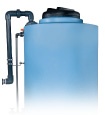Municipal projects require detailed specifications for anything purchased as a capital expense. At Poly Processing Company, we’ve teamed up with national engineering firms and municipalities to develop industry leading pre-written engineering specifications for our three most popular polyethylene chemical tanks: the SAFE-Tank®, the vertical tank with IMFO® and the upright vertical storage tank.
Topics:
Certifications and Standards,
Value Added,
Chemical Storage
Proper tank design is crucial to successful safe chemical storage. Purchasing a chemical storage tank isn’t just about selecting the right size — it is vital to design the proper tank configuration for the safety of your employees, the protection of the environment, and to leverage your investment.
Topics:
Value Added
When you have questions about chemical storage or concerns about your chemical storage tank system, you want quick answers. You want to know who to call and get a live voice without getting the runaround. A solid customer service team takes great pride in delivering service that saves you time and eliminates any hassles.
Topics:
Value Added
Poly Processing has three manufacturing plants in the United States. In each facility, we use a multi-step quality control process that meets and/or exceeds industry standards, including ASTM D-1998. The ASTM D-1998 standard is designed to give end users a margin of safety and peace of mind. It’s a voluntary standard, and not all tank manufacturers follow it.
Topics:
Value Added
Before you purchase a chemical storage tank, it’s important to know what kind of service to expect from the manufacturer — immediately and for years to come. You might have installation and startup needs, but you may also have questions about retrofitting a tank or installing new tanks. Many tank manufacturers don’t have a field service team or service department. Instead, they hire a local fix-it professional who isn’t familiar with their storage systems. Other times, you might have to find a service technician yourself. Poly Processing has our own on-site nationwide field service team that can service your PPC chemical storage tank at your facility. Let’s take a look at the types of on-site service our dedicated technicians are doing on a daily basis.
Topics:
Value Added
Just because different tanks are made from polyethylene, doesn’t mean they will give you the same performance. Various polyethylene tanks may not even be suitable for storing the type of chemical you use. Polyethylene is available in several different types of resin. Some types are made for injection molding, others for extrusion, others for blow molding and yet others for rotational molding.
Topics:
Value Added,
Tank Design and Materials
While, at a glance, it’s impossible to gauge the life of your polyethylene chemical storage tank, there are many things to know and consider that will help you extend the life of your tank to its fullest potential. It is important to know that from the production of the tank, through installation, it is expertly manufactured with all of the right gaskets and fittings. After tank installation, it is important to have it inspected regularly to look for problems that could cause tank failure.
Topics:
Value Added
You’ve done the hard part already. You’ve talked to a chemical tank expert at Poly Processing, designed your chemical tank system, double-checked that all the fittings you’ve ordered are compatible with your chemical, and you’re ready for your new storage tank system to be delivered. Now that your order is placed and approved, you’re preparing to receive your polyethylene chemical storage tank within eight to ten weeks, there are some steps you need to have in place before your tank arrives. But what should you expect when your polyethylene tank arrives?
Topics:
Installation and Field Service,
Value Added
Poly Processing works diligently to produce each and every chemical storage tank to spec. But if a tank isn’t installed correctly it could lead to damage, leaks, safety issues for personnel, and a shorter tank life. Everyone should take chemical tank installation seriously.
Topics:
Installation and Field Service,
Value Added
When a chemical storage tank fails, the costs can be significant to your organization. Regulatory concerns, environmental cleanup, lawsuits from property damage, and injury to employees are costly exposures. Let’s take a look at a few of the reasons chemical storage tanks fail.
Topics:
Value Added



